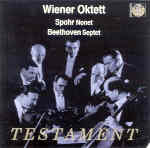Older collectors with a nostalgic bent may want to hear this disc to revisit the recordings through which they discovered these works by Spohr and Beethoven. But this time they may find that nostalgia ain’t what it used to be. For while the performances are quite enjoyable on their own terms, the Vienna Octet’s approach and individual idiosyncrasies make them more an artifact of a particular performance style and period than recommendable reference versions. But historical buffs, the curious, and those who respond to this group’s approach will be happy campers.
The Vienna Octet was founded in 1947 by the Boskovsky brothers, violinist Willi and clarinetist Alfred, along with colleagues from the Vienna Philharmonic and the Vienna Symphony. Their definition of “Octet” was flexible enough to adopt configurations ranging from trios to 10-piece works, often with associated guests. They embodied the echt-Viennese style, which, aided and abetted by their Decca LPs, quickly became accepted as the “correct” style for central European music. It’s no longer in fashion and this disc helps us to understand why.
The Spohr Nonet, for example, is a vivacious four-movement work. But the ensemble lathers it with a layer of thick goo that obscures everything except the charm, which then becomes too much of a good thing. The final Vivace movement is champagne music that’s lost its bubbles, Allegros are laid back, and their heavy charm squeezes the gravity out of the gorgeous Adagio. Rhythms are squared off, ensemble sound is thick, and there’s a disconcerting tendency to make micropauses between the end of one solo instrumental passage and the start of another, breaking the music’s flow. It’s amazing how those nanoseconds add up to impede the flow of the music. Add to this leader Willy Boskovsky’s thin, uningratiating sound, and disappointment is complete.
The Beethoven goes much better. Though similar faults intrude, the Octet does capture a fair degree of the work’s quality. But while the ensemble finds soulfulness in the long Adagio and the humor of the Scherzo, its heavy rhythmic accents in the Minuet almost turn it into a March, and those little hesitations and micropauses crop up from time to time, most damagingly in the Adagio.
Some of these shortcomings are exacerbated by the monophonic sound, for while Decca’s early 1950s engineering sometimes was superb, its early LPs often were marred by wiry treble and tubby bass. Both afflictions are apparent in the 1952 Nonet and to a much lesser degree in the 1954 Beethoven Septet, whose sound has more bite and presence if not the transparency of a modern recording.
































